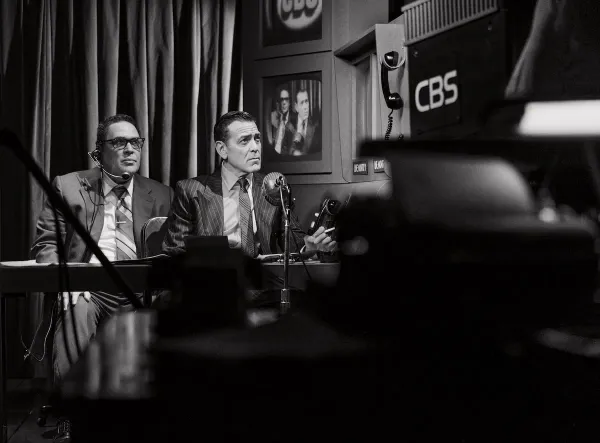★★★ (3 out of 4)
There was some clanking stage furniture, actor jitters were in evidence and—Piper, nooo— George Clooney flubbed a line, otherwise all went smoothly if unexcitingly during Saturday night’s CNN and Max telecast of “Good Night, and Good Luck,” from Broadway’s Winter Garden Theatre. Historic or not (there are other filmed plays, check National Theater Live), the show was a throwback to the real-time TV days of the 1950s when the actors had to work without a net. Clooney, with a well-earned Tony nomination to show for his efforts, seems exhilarated to bring his performance and this play to a wider audience. Broadway tickets went for as much a grand a pop. On TV, we all had a free front-row seat to see what all the shouting was about.
Well, here it is. Set in 1954, seven years before Clooney was born. "Good Night, and Good Luck” celebrates resistance in the face of political bullying, a tragically timely topic in the Trump era. Clooney plays crusading journalist Edward R. Murrow (1908-1965) whose unshowy integrity would surely make him a target over at Mar-a-Lago. Murrow, who made his bones covering WW2 and the McCarthy era, is a personal hero for Clooney, who grew up hearing admiring tales from his councilwoman mother and anchorman dad.
That led to Clooney directing and cowriting (with Grant Heslov) 2005’s Oscar-nominated “Good Night, and Good Luck.” Feeling himself too young and gravitas-free at 42, he ceded the Murrow role to the excellent David Strathairn, casting himself as Murrow ally Fred Friendly. It took 20 years and his first major shot at Broadway for Clooney and Murrow to unite forces. Seeing Clooney looking and sounding like someone else was jarring at first, his star persona hidden under the jet-black hair and formal vocal cadences that marked Murrow. And yet his nuanced portrayal feels right in every detail. Clooney never falls into the trap of playing Murrow as a noble monument — he’s fallible, funny and human. And so we pay attention.
.
But, to trot out an old theater joke, how was the play, Mrs. Lincoln? The transition from stage to recorded live performance with 20 cameras prowling the theater, comes with a charge of intimacy that can turn clumsy from the mix of two mediums. Theater is its own animal and you need to be there for the full experience. The camera adds a layer of distance, especially with the audience sitting there. There’s also a perceived drag on the pacing of David Cromer’s direction as the actors move from one spot to another on Scott Pask‘s clever set of office spaces and a control room at CBS News. More concerningly, there’s a flatness in some performances absent in Clooney’s finely wrought 2005 film. An exception is Glenn Fleshler as Friendly, the role Clooney played in the film, and a very touching Clark Gregg as news anchor Don Hollenbeck, whose psyche was far from impervious to personal attacks.
As in the movie, the pivotal role of Joseph McCarthy, the junior senator from Wisconsin who found alleged commies under every harmless rock, is played with overdone sweaty, monstrous manipulation by McCarthy himself, through the judicious use of actual film clips. Though I’m not a fan of seeing supersized images of characters projected on a theater wall, it works here. Less so when Clooney is given the same treatment during a key Murrow speech. A live actor on a live stage delivering dialogue without closeups and gimmicks is a thing of beauty. Save the cheap tricks for political ad campaigns. Clooney is a skilled actor who knows that silence can be more than effective than a grand gesture.
That good news is that Clooney and company never lose the thread that gives “Good Night..." its indelible power. As Murrow said in a rousing 1958 speech, which frames this story on stage and screen, the powers that be much prefer TV as “an instrument to distract, delude, amuse and insulate.” Now that’s a theme to run with in whatever form it takes. “Clooney knows exactly what he’s doing: blowing the dust off ancient TV history to expose today’s fat, complacent news media as even more ready to bow to networks, sponsors and the White House.” I wrote those words 20 years ago in a review for Rolling Stone. That they still apply right this very minute is scarier than any horror movie. Maybe some day we’ll be ready to say good night and good luck to Mr. Murrow. But not yet. Not by a longshot.

